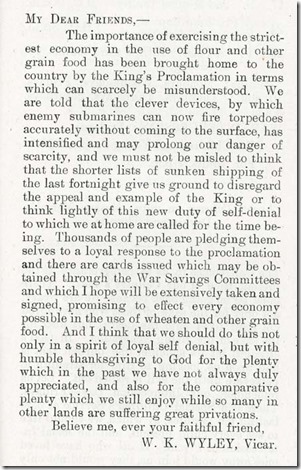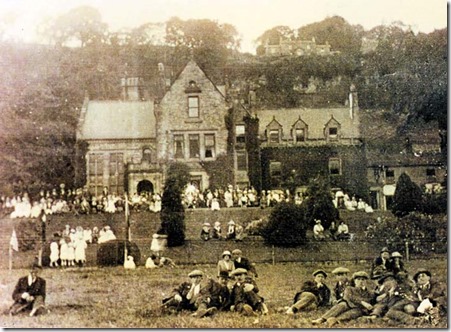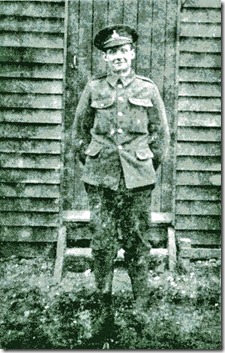In December 1918 the vicar of Aysgarth, the Rev William K Wyley wrote in the parish letter: “I wonder if, in the years to come, November 11 will overshadow the 5th as a day greatly to be remembered.”
He was, however, very aware that dalesfolk were in the midst of the great Spanish Flu epidemic and that the WW1 peace agreement had not yet been signed.
Two soldiers, L/Cpl John Wood of Carperby and Driver William Metcalfe of Aysgarth, were given compassionate leave when their wives became ill with the flu. Both women died, Eleanor Metcalfe (22) before her husband got home.
Soldiers began to be demobbed in early 1919 and this led to Mr Wyley publishing an interesting ‘advert’ in the parish magazine: “The Employment Exchange at Northallerton has asked me to state that it has on its Registers women discharged from War Service and suitable for several classes of employment.”
It was acknowledged that women had an important part to play in reconstruction. The role that women had played during the Great War was recognised when limited suffrage was granted to them in 1918.
In October 1918 Mr Wyley commented: “We are approaching the time when, as a nation, we shall realize more fully what a tremendous change the war has made in the social, industrial and religious life of England.”
In that letter he reminded everyone about the great need of economy in the use of oil and especially coal. “I know that very many of us are reducing our fires to a very low minimum, and where wood fuel is available I am sure we shall be careful to ‘do our bit’ in this respect for our country.” He had regularly emphasised the need for food economy and, in June 1917, explained why (below).
WW1 had a massive impact upon the lives of everyone and not just because of the ravenous war machine in France and Belgium. The parish magazines not only listed those who had enlisted – but also those who were killed.
When war first broke out local people didn’t know how to respond. Initially events were cancelled but it didn’t take long for people to realise that they could use the church’s flower festivals and other celebrations to raise money for the War Working Parties or to be sent direct to hospitals caring for the war wounded. Concerts, jumble sales and tea parties were also held.
In May 1915 there was a bold headline: “200,000 Eggs wanted weekly for the wounded.” The National Egg Collection had been launched with the request that each household should send one each week to help the recovery of wounded soldiers. The West Burton and District Scout Troop took on the job in the parish and by late November had collected 6,144 eggs. These were sent to military hospitals in France and Malta and some to wounded soldiers at Leeds Infirmary.
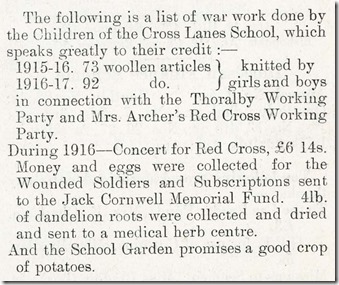 Right: published in the Aysgarth section of The Upper Dales Parish Magazine in December 1917
Right: published in the Aysgarth section of The Upper Dales Parish Magazine in December 1917
Children helped with collecting sphagnum moss for dressing wounds, made items of clothing and, in November 1917, were encouraged to collect horse chestnuts for munitions and also waste paper. Mr Wyley reported that within two months he received half hundredweight of horse chestnuts and four hundredweight of waste paper.
The times of services had to be adjusted when lighting restrictions were introduced in February 1916 following air raids by Zeppelins. And the shortage of manpower was beginning to have an effect. In July 1918 Mr Wyley wrote: “May haytime be favourable and health and strength sufficient to tide over the shortage of labour.”
Conscription was introduced in January 1916 and in July 1917 he wrote: “I am glad to say that the local Tribunal has granted exemption to our Sexton on condition that he is released as far as possible for agricultural and other work of National importance.
The signing of the Peace Treaty in July 1919 led to celebrations throughout the country and the Empire. But in Wensleydale the hay harvest had to come first. Mr Wyley commented: “I hope that when all the hay has been led each village… will do something to mark our rejoicing over the Peace and our gratitude to the men who won the possibility of it.”
This has been edited from the Aysgarth sections of the Upper Wensleydale Parish Magazines 1914-1918. Aysgarth parish consists of Aysgarth, Carperby, Bishopdale, Thoralby, Thornton Rust and West Burton.
Below: The peace celebrations in 1919 at The Rookery in Bishopdale (courtesy DCM) The Rookery no longer exists.
For more stories see the WWI section of the Thoralby Through Time website.
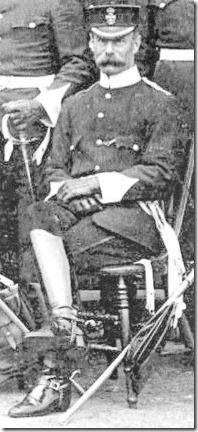 The biggest military funeral at Aysgarth church during WW1 was that for Col John William Lodge with the band of his regiment and the detachments of two battalions being present. The firing party fired volleys over his grave and buglers sounded the Last Post. He was 60-years-old when, on leave at his home at The Rookery in Bishopdale, he died on 23 August 1917, after a short illness.
The biggest military funeral at Aysgarth church during WW1 was that for Col John William Lodge with the band of his regiment and the detachments of two battalions being present. The firing party fired volleys over his grave and buglers sounded the Last Post. He was 60-years-old when, on leave at his home at The Rookery in Bishopdale, he died on 23 August 1917, after a short illness.
He had served in the Boer War and from 1906-1912 had commanded the 3rd Battalion of the Yorkshire Regiment. At the outbreak of the 1st World War he had immediately returned to the battalion as a major and in May 1916 was appointed to the command of a Garrison Battalion. (Information and photo courtesy Wensleydale Remembered)
There wasn’t a military funeral for Pte John Percival but there is a military gravestone. He was 21-years-old when he died and was buried on 12 April 1918.
This obituary was published about him:
“He enlisted when he was 19, and after being trained at Rugeley Camp, went to France in April 1916, and was through the battle of the Somme, being badly wounded in the hand in September 1916. He was sent back to England for treatment, and made a sufficient recovery to enable him to return to service.
“As he was a competent motor driver he was transferred by the authorities from the Yorkshire Regiment to the Motor Transport, Army Service Corps, in June 1917. In this work he did good service until October last, when he was badly gassed, and was seriously ill. He returned to England, and was in the 1st London General Hospital, Camberwell, until November 27th, when he was officially discharged from the Army as physically unfit for further service.
“A relative went to London to bring him home. He was very weak, and while crossing London an air raid was proceeding, and the journey was several times interrupted. Arrived at Aysgarth he was very happy to see his home and family, and seemed to revive for a while, but the gas had seriously damaged his lungs and recovery was seen to be impossible.
“Though relatives and friends nursed him tenderly day and night there was no progress towards health. The funeral was largely attended by sympathising friends, and some beautiful wreaths and affectionate messages were sent.”
